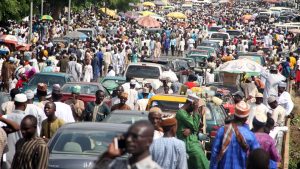
Dr. Chiwuike Uba, a development Economist, has consulted for the World Bank and other international institutions on a wide range of perennial economic challenges among developing economies. He spoke about critical issues that shaped Nigeria’s economy, focusing on the aggressive implementation of the cashless economy and the 2023 election as an economic variable.
What are your thoughts on the economy? Are we better now than at the start of the year?
Overall, Nigeria’s economy could be described as faltering and unstable, with all macroeconomic indicators and socio-economic indices heading south. Nigeria is facing severe monetary and fiscal challenges at the same time. This is evidenced in the rising interest rates, budget deficit, debt and interest on debts, gyrating exchange rate, shrinking revenue, insecurity, corruption, high inflation and unemployment, limited power supply, low productivity, and weak macroeconomic management among others. A cursory look at the indicators shows that Nigeria’s unemployment rate increased by 437 percent from 6.2 percent in 2015 to 33.3 per cent as of the fourth quarter of 2020, according to unemployment data from NBS. Sadly, there are currently no real targeted actions to stem the rise in unemployment.
Our current education system is not innovative and driven by entrepreneurship, critical thinking, and problem-solving skills. On average, the Academic Staff Union of Universities (ASUU) has spent 34 per cent of total academic days, representing more than three days in every 10 working days on strike since 1999. The future of the Nigerian economy is supposed to be knowledge-driven. Unfortunately, the acquisition and development of the needed knowledge are being hampered by the unfolding paralysis, occasioned by poor basic education and incessant strikes at the tertiary education level. Compared with knowledge, the devastating impacts of dried crude oil wells on Nigeria’s economy will be child’s play if we don’t solve this problem urgently. Increased insecurity, human capital weakness, and social and economic development are linked to poor education.
Nigerians are faced with poverty like never before, coupled with a deteriorating standard of living as a result of rising prices of goods and services triggered by rising inflation and other economic challenges. How can the economy be okay with over 133 million Nigerians in multidimensional poverty, which is nothing but abject poverty? Nigerians are now more miserable than they were in 2015. Nigeria’s misery index rose to 62.79 points in July 2022 compared to 47.7 points in 2015. The inflation rate is largely driven by the high costs of petroleum products, exchange rate volatility, electricity, and insecurity. At both official and parallel exchange rate windows, the naira depreciated by 126 per cent and 276 per cent, respectively compared to 2015 exchange rates. The inflation rate of 21.09 per cent in October 2022 is an increase of 134 percent from the average inflation rate of 9.01 percent in 2015. The excess crude account has also depleted to about $376k from $2.1 billion in 2015.
The interest rate has not fared better either. The interest rate has increased by 26.9 per cent from an MPR of 13 per cent in 2015 to an MPR of 16.5 per cent as of September 2022. Economic growth represented by GDP has also trended downwards. It is clear that Nigeria’s economy was not only better before the administration of President Muhammadu Buhari, but also better in early 2022 compared to now. In particular, between Q1 2022 and Q3 2022, agricultural and services growth rates declined by 58% and six percent respectively. Overall, the non-oil growth rate decreased by 30 per cent and the oil growth rate by 13 per cent. The real GDP growth rate at basic prices decreased by 28 percent from 3.11 percent in Q1 to 2.25 percent in Q3. In the same vein, real GDP growth at market prices fell by 34 percent from 3.6 percent percent in Q1 to 2.28 per cent in Q3. Export declined by 16.4 percent from N7.1 trillion in Q1 to N5.9trn in Q3, non-oil export declined by 38.8 percent from N715 billion in Q1 to N437 billion in Q3, and crude oil export by 17.1 percent compared to 13.8 percent decline in non-crude oil export during the year. In general, the economy has not fared well, which is why it is urgent to implement policies and interventions to reverse the economic collapse, which is in auto-decline mode.
What would you consider the most impactful economic issues in the year?
I see the high poverty rate, oil theft, and pipeline vandalism as the most significant economic issues in Nigeria in 2022. This is due to their ripple effects on Nigeria’s revenue, inflation, insecurity, and fiscal deficit among other myriad socio-economic challenges facing the country. According to a 2022 study supported by Shell, oil theft costs Nigeria N30 to 60 trillion yearly. You can imagine the impact the loss of revenue would have had on the economy had it not been lost and had it been properly used for the public good.
The NSA recently warned that Nigeria could lose up to $23 billion in 2023 if the theft of crude oil continues. Despite an increase in crude oil price, Nigeria’s half-year gross oil revenue was N2.17 trillion compared to the budget projection of N4.68 trillion for the same period, indicating a shortfall of 53.63 percent against the 2022 half-year budget estimate. Only N242.3 billion accrued into the Federation Account as actual net oil revenue as of June 2022, depicting a decrease of over 80 per cent from the estimated half-year budget. Unfortunately, the decline in revenue exacerbated the already high fiscal deficit for the year, leading to a half-year fiscal deficit of N5.5 trillion, which is 77.2 percent above the projected amount.
Recourse to ways and means, and external and domestic borrowing to finance the deficit has only created more economic challenges than providing the necessary solution. For example, the increase in ways and means has contributed around 40 percent to the money supply, which in turn contributes 7.6 percent to inflation. Debt servicing, which stood at N2.6 trillion in the first half, impaired the implementation of capital projects within the half-year period. As usual, instead of facing the threat of oil theft head-on, the government has chosen to set up committees that will produce reports that will end up on the bookshelf.
You briefly talked about the inflation concern, which is decelerating in advanced economies. Has Nigeria’s inflation peaked?
Inflation in Nigeria has not reached its highest level. There is no question that inflation will continue to increase in 2023 because the engines of inflation have not yet been properly combated. Over 70 per cent of inflation is driven by the exchange rate (depreciation of the naira), with diesel and aviation accounting for over 11 per cent and about seven per cent by other exogenous shocks. Interestingly, the contribution of money supply to inflation is below 10 per cent. Yet, the policy direction of the CBN largely focuses on the money supply, without the effort needed to address ways and means and the question of the exchange rate. The CBN’s contribution to the federal government through ways and means is about 40 per cent of the total money supply, which in turn contributes to inflation.
The new policy on maximum cash withdrawals can help tighten the money supply, but it is obvious that election spending will likely increase liquidity. The 2022 floods will affect the yield of agricultural products (including over zero per cent post-harvest loss) and could likely lead to higher commodity prices as food inflation hits rooftops. Of greater concern is the CBN’s approach to the triple challenge of inflation, interest rates and exchange rates. The cutting down of trees, discontinuance of the sale of foreign currencies to BDCs, fight against aboki fx, the arrest of BDC operators and other policy of CBN have failed to resolve the issues. You cannot solve structural problems with a knee-jerk approach that doesn’t rely on evidence. Furthermore, the misalignment, disagreement and poor synergy between the monetary and fiscal authorities seem to hamper governments’ efforts to combat rising inflation. We have to rethink our strategy if we want to properly deal with this challenge.
With MPR currently at 16.5 per cent, are you worried about the growth prospect?
I am concerned with the high MPR, which is currently at 16.5 per cent. Nigeria’s growth rate is already on a downward trajectory, dropping from 3.11 per cent in Q1 to 2.25 per cent in Q3, with no prospects for improvement any time soon. How can we expect growth when the high MPR will discourage companies from spending, thereby reducing productivity and even the number of workers? We are already facing high unemployment and associated consequences. For example, it was reported that the stock market lost more than N96 billion in three trading sessions when the MPR was increased from 14 per cent.
This gives the impression that CBN policy is not based on empiricism (available evidence) when it focuses on inflation from the money supply perspective alone. Even if we want to focus on money supply, what effort has the CBN made to reduce the ways and means, which contribute over 40 per cent of the total money supply? As I pointed out earlier, the depreciation of the naira, oil products and other exogenous shocks, foreign loans, ways and means are the main drivers of current inflation in Nigeria. The contribution of money supply is small, but the CBN seems to focus on money supply, despite the impact of a high MPR on the economy. As a matter of fact, right now there seems to be a positive correlation between MPR and inflation. The higher the MPR, the higher the inflation rate because we are targeting the wrong metrics.
The increase in MPR in recent times has only created more problems for individuals, companies and other investors who already face multiple challenges. The truth remains that high MPR can only lead to increase in manufacturing/production input costs, which will naturally transmit to higher inflation from higher prices of goods and constrained production in the economy.
We started the year with so much uncertainty at the start of the year. Is 2023 anyway predictable?
Nothing in Nigeria is currently predictable, except waiting for funny news that can only be told in folk tales. We can predict that more snakes will swallow more money, press releases will be issued and the matter will die a natural death. Nevertheless, it is foreseeable that the 2023 budget presented to the National Assembly will be difficult to finance because of unrealistic revenue and spending forecasts. The budgetary parameters are not realistic and could therefore be revised in 2023 to take into account the reality. Food insecurity will increase in 2023 following the 2022 floods and poor implementation of agriculture policies by governments. The increase in government debt, inflation, exchange rate volatility, the depreciation of the naira and others will continue in 2023.
On the other hand, there is uncertainty surrounding the 2023 election and its result. It is clear that the 2023 presidential election has assumed an ethnic and religious inclination, which is bad for the peace of the nation. Young people or rather all citizens are angry. According to their perception of the conduct of elections, we may have a crisis waiting to burst after the election. To this end, INEC, NOA and other relevant governmental and non-governmental organisations must engage in ongoing awareness throughout the country. Citizens need to be sensitised and educated on the need for peace and development. We cannot continue to go around in circles, making motions without movement. I believe that Nigeria will become great again.
Is the 2023 election a positive variable in your thought, putting into context our political history and the current macro indices?
I am naturally opposed to political issues because of the bias that may be interpreted in my comments. Nonetheless, since this question has more to do with the implications of the 2023 elections for Nigeria’s economy, I will make an effort to comment on it. First, it is important to note that while we have new candidates running for a variety of positions, they are all of the same type. No exception! However, it is likely that things will improve slightly under another administrator in 2023. The new administration may, in view of the anger and resentment of the citizens, want to make the first attempts to improve things. Nigeria needs both political and economic restructuring underpinned by innovation, competitiveness and productivity—a complete reversal from ‘sharing’ formula to ‘contributing’ formula. If a state/region knows that its survival depends on its competitiveness and the revenues generated within the state, they will become more innovative and productive.
Take a look at all the manifestos of the parties and/or candidates, you will agree that these are beautiful documents that seek to rewrite what we already know. Our problems and challenges. Unfortunately, none of them, not one of them, has been able to formulate practical ways of dealing with these challenges and problems. They are more interested in winning the elections by speaking nicely to Nigerians and denigrating one another. That nature will be interpreted as a lack of capacity to address Nigeria’s challenges. This demonstrates that we can continue with the usual blame games and transfer of responsibilities. It is clear that the CBN demonetisation policy could reduce the purchase of votes and other related election vices in 2023. Unfortunately, the worst of the candidates may emerge as the winner at the end and the cycle continues.
The CBN hopes to demonetize the old N200, N500 and N1000 banknotes on January 31. Meanwhile, only a tiny portion of the N2.7 trillion outside the banking system has been turned in. How do we deal with the short-term distortions?
The CBN recently claimed that more than 85 per cent of the currency in circulation is outside the formal banking system. The implication of this is that there are “banks” outside the formal banking system which keep more than 85 per cent of currency in circulation. No doubt, there is evidence that some people prefer to house their money in their bedrooms, personal safe, water tanks, suction systems and other unimaginable places. Agree that there are people who engage in this to hide their ill-gotten wealth, but it is important to determine why Nigeria still has such a large unbanked population. This is a problem that must be resolved first. Financial inclusion and deepening should be pursued in a strategic manner. The CBN recently approved agency banking as evidenced by the number of POS operators everywhere. Unfortunately, with the new policy on limits on cash withdrawals, most of the agencies would close shop and their staff thrown into the unemployment net once again.
Recently, I read a report that alluded to the fact that the total cash in circulation represents about six per cent of the total money supply. If this is true, then it demystifies the CBN fuse about money outside the official banking system. Consequently, I still have a hard time understanding the reasoning behind the CBN’s complaints about money outside the banks’ vaults. Money is not meant to be in CBN or banks’ vaults. It’s meant to keep moving, and facilitating transactions. Obviously, it is clear that one of the main objectives of redesigning the currency is to migrate transactions from physical money to electronic money. The eNaira or e-cash policy is a good policy, but it is a hastily implemented policy, without first ensuring the needed infrastructure and platform to efficiently and effectively implement the policy are in place. And if it is not well managed, it will cause chaos and damage the economy. Without any doubt, if well managed, digital/e-transactions will create a better audit trail for tax, accounting and security.
Market frictions and distortions/disruptions to electronic banking services have not been addressed. What has the CBN done to address the issue of debits for failed transactions and delays in executing transactions caused by system failures and/or poor networks? Most times, it takes banks months to resolve and reverse failed transactions. What is the incentive for electronic banking? In many urban areas, electronic transactions are greatly limited by poor bank networks, unreliable electricity and telecommunications services. These issues force everyone to embrace electronic transactions is virtually beyond CBN, except that the intention is to unleash chaos and suffering to the citizens. Moreover, our large and increasing army of illiterates is largely limited to physical money and have little or no skills for e-banking. Currently, the only way to conduct financial transactions in most of rural Nigeria is through physical cash because of the poor bank network, lack of electricity and telecommunications services. Obviously, the solution lies in the collaboration between the CBN, banks, telecoms and electricity providers to solve the problems associated with the large-scale adoption of the electronic mode of financial transactions.
I think the short period for the introduction of the demonetisation policy is to prevent the asset bubble. In fact, demonetisation can burst the existing asset bubble by slowing down the flow of black money in the sector. Unlike the USA where their old currencies are still accepted as a legal tender, the old redesigned naira notes will cease to be a legal tender at the end of January, 2023. In the end, any old banknote not deposited in the banks will be useless once the allotted time has expired. In the last 10 years, real estate was considered as the best place to park black money, and this resulted in home prices going up many folds than realistic value due to the artificial demand. There are many empty, unoccupied and dilapidated buildings scattered all over Nigeria, but many people are homeless. With demonetisation, potential buyers will only buy if there is a need for self-occupancy. There is a likelihood that speculative buyers will move away from the market. This will, in turn, decrease cash transactions in the real estate sector and make the housing market more transparent and help attract foreign investment.
As part of improved measures to avert asset bubbles, the federal government needs to work with the subnational governments to implement property registration and tax on properties, to discourage speculative buyers too. Each property should be linked to BVN and NIN for proper identification of ownership. More importantly, there is a need to improve the general monitoring and analysis of asset price developments and potential financial imbalances. This would require strengthening the micro-prudential and macro-prudential regulatory framework through improved liquidity and capital provisions. Asset bubbles are typically caused by lack of investment opportunities or loss of confidence in other forms of investment due to inflation, which erodes financial returns. It is therefore important to tackle the increase in inflation as a matter of urgency by focusing on the major drivers of inflation.
Investment in social sectors and provision of necessary infrastructure that promotes and protects investments is better than the current resort to ‘dashing’ or ‘pumping’ money into a few selected private companies. What most businesses need is a good business environment with electricity, security, and a decent transportation system. If the government focuses on addressing this paralysis, it will serve the society better. We must become more productive in order to address our socioeconomic challenges.








